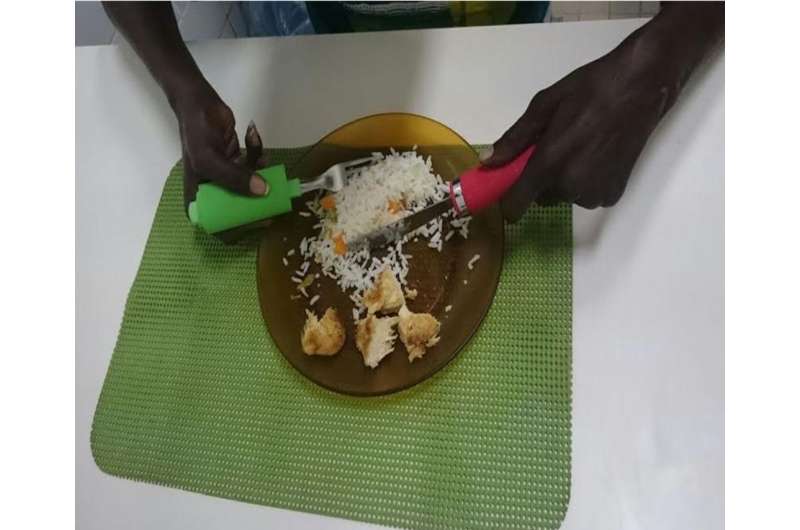Modified household utensils improve autonomy and lives of people with leprosy

Assistive technology—the use of (frequently modified or customized) equipment to improve the functional capabilities of people with special needs—is an important therapeutic tool. A study published in PLOS Neglected Tropical Diseases finds that household utensils modified in relatively simple and cheap ways can increase autonomy and self-esteem and positively impact the quality of life of patients with leprosy.
Fatima Maia from the Universidade Federal do Rio de Janeiro, Brazil, worked with a group of 15 patients with leprosy who had lost some of their manual dexterity. The researchers started by compiling a list of tools used in daily living routine that could be modified to make them usable or improve their utility for the patients. They also did an evaluation of each patient's sensory and motor abilities. They then offered to modify any tool from the list (including eating utensils, mugs, toothbrushes, shavers, pliers, and screwdrivers) according to the patients' suggestions and feedback, and trained the patients in the use of the modified tools selected.
To evaluate the impact, the researchers conducted a qualitative study on the patients' responses to the tools. (Qualitative studies seek an understanding of participants' experiences, opinions, feelings, and motivations. They often employ in-depth interviews with a relatively small number of individuals or focus groups). In this case, the researchers selected 8 participants for the in-depth interviews. Each participant had selected between 4 and 7 modified tools and had attended between 5 and 9 training sessions.
Questions in the interviews were designed to address the contribution of the modified devices to independent living, and the feelings and sensations provoked by their use. Overall, the modified tools and utensils increased the patients' independence and self-esteem. Patients expressed joy at being able to open bottles, brush their teeth with a toothbrush, and write using the modified pens. They also were relieved to be less dependent on others, commenting, for example, "do you know how hard it is to ask people for help who don't want to help you?"
Patients also expressed some frustration with their overall situation and with remaining limitations. And while some were proud to use the modified tools and utensils in public, most patients did not like to be seen using them, commenting that the tools "attract too much attention". The researchers also recorded non-verbal communication, and, besides some expression of despair and frustration, noted many smiles, laughs, and victory signs during the interviews.
Their study shows, the researchers conclude, how important it is to provide patients with instruments that allow the care of the self, and how much this contributes to the preservation of their autonomy and social inclusion.
More information: PLOS Neglected Tropical Diseases, DOI: 10.1371/journal.pntd.0004644

















